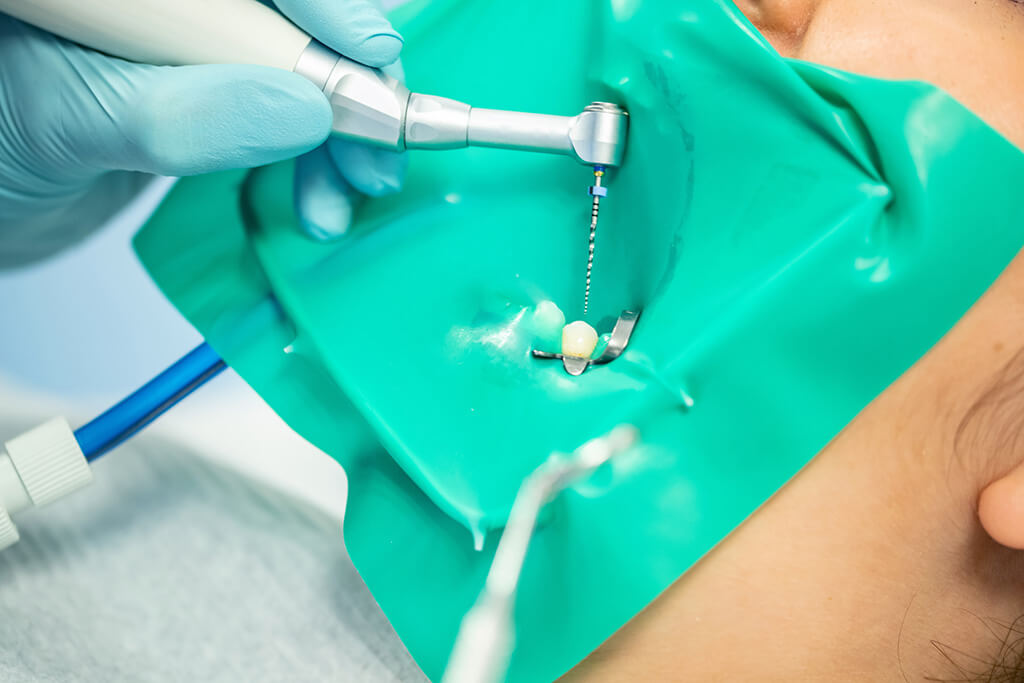Understanding the cost of root canal treatment (also known as endodontic treatment) is crucial for anyone facing this dental procedure.
The cost typically ranges from $500 to $1,500.
In Singapore, prices can vary significantly depending on the specific clinic and the complexity of the treatment.
This variation is due to factors such as the affected tooth being treated and the complexity of the case.
By the end of this article, you will understand what influences the cost of root canal treatment in Singapore to help you make informed decisions about your dental care.
Root canal treatment cost at Ocean Dental
Depending on which tooth requires the treatment, the price of root canal treatment at Ocean Dental may vary as the number of root canals and complexity differs.
- Front teeth: $545-$654 ($500 – $600 before GST)
- Premolar: $708.50 – $817.50 ($650-$750 before GST)
- Molar: $1,090 – $1,308 ($1,000-$1,200 before GST)
Understanding Root Canal Treatment
Root canal treatment is a dental procedure that addresses infections at the pulp of a tooth.
This procedure can save a natural tooth that might otherwise need tooth extraction.
What is Root Canal Treatment?
A root canal treatment is a procedure used to save a badly damaged or infected tooth.
During the process, local anesthesia will be administered to alleviate your root canal pain before we remove the infected tissue inside the tooth.
This pulp consists of nerves and blood vessels that can become infected due to deep decay, trauma, or a crack in the tooth.
During the procedure, a dental dam (also known as a rubber dam) will be placed to isolate the tooth and prevent neighbouring teeth from fine needles and chemicals used in the process.

After removing the pulp, we thoroughly clean and disinfect the inside of the tooth.
Then, we fill and seal it to prevent further infection. Often, a dental crown is placed on the tooth afterward to restore its function and appearance.
The procedure helps alleviate pain and stops the infection from spreading to surrounding tissues.
When is Root Canal Treatment necessary?
A root canal treatment becomes necessary when the pulp inside the tooth becomes infected or severely inflamed.
Decay that reaches deep into the tooth, cracks and chips that expose the pulp, and repeated dental procedures on the same tooth can all lead to the need for a root canal.
Without treatment, the infection can spread, leading to abscesses and more serious health issues.
Some signs and symptoms of infected pulp tissue/ pulp inflammation include:
- Sharp pain on thermal stimulus which lingers and not go away immediately
- Spontaneous pain (unprovoked) which may affect sleep and painkillers usually does not help
- Pain spreading to other areas
- Pain worsening on body postural changes (such as leaning forward or lying down)
- Pain may be relieved momentarily by cold water/ food
- Pain on biting/ chewing
- Swollen gums or pus discharge
- Tooth discolouration
Acting promptly when these signs appear can save the tooth and prevent complications.
Factors Influencing the Cost of Root Canal Treatment
There are several factors that can influence the cost of a root canal treatment.
One important factor is the type of tooth that needs treatment. Incisors, canine and premolars typically cost less to treat than molars.
For example, treating molars can be more expensive due to their size, number of canals and complexity.

Location of clinic also plays a significant role. Clinics in different areas may charge various prices.
For instance, the cost at Central Business District (CBD) or town area might be more than clinics located at heartland areas.
Dentist’s Experience can affect the price.
More experienced dentists might charge higher fees due to their expertise and skill level.
Complexity of the Case: The more complex the root canal procedure, the higher the cost can be. This includes factors such as the anatomy/ shape of the roots and the extent of the remaining tooth structure.
Technology and Equipment used during the procedure may contribute to the cost. Advanced technology ensures better treatment but can increase the price.
Lastly, clinic reputation can affect the cost.
Renowned clinics and specialist clinics might have higher charges due to their established reputation and quality of care.
Understanding these factors can help us budget better for a root canal treatment. Making informed decisions ensures we get the necessary care without unexpected financial burdens.
Average Cost of Root Canal Treatment
Root canal treatment can vary widely in cost depending on several factors.
Let’s look at how the type of tooth affects the price and what additional costs might arise.
Cost by Tooth Type
The cost of root canal treatment often depends on the type of tooth being treated.
For instance, incisors and premolars are generally less expensive.
Treatments for these teeth typically range from $500 to $900.
Molar teeth tend to be the most costly for a root canal treatment.
Due to their location and complexity, the price can go from $1,000 to $1,500 or more.
Additional Costs to Consider
Apart from the main procedure, there are additional costs that patients should be aware of Dental X-rays are often necessary to assess the extent of the damage and can add to the bill.
These X-rays or 3D CBCT scan could cost anywhere between $25 to $150.

Consultation fees or initial consultation fees are another factor to consider, which might range from $25 to $100 depending on the clinic and the dentist’s expertise.
Post-treatment medication such as pain relievers or antibiotics can add an extra $20 to $50.
Some patients may also need a crown after the root canal to protect the tooth.
Crowns can be quite expensive, ranging from $950 to $1,500.
This makes the total cost of getting a root canal significantly higher when these additional expenses are factored in.
Insurance and Subsidy
Understanding the cost of root canal treatment is crucial.
It’s essential to know what your dental insurance covers and what financing options are available to help manage expenses.
Dental Insurance Coverage for Root Canal Treatment
Most dental insurance plans in Singapore cover a portion of the root canal treatment cost.
Coverage often varies depending on the specific policy.
Typically, dental insurance sees root canal therapy as a basic procedure, which means it is partially reimbursable.
In some cases, if root canal treatment and crown is required due to trauma or an accident, insurance policy such as accident plans may cover the entire treatment costs.
We recommend reviewing your insurance policy carefully.
Check the specific coverage details and any limits on the reimbursement amount.
Some plans may also require a co-payment or deductible, so be sure to factor these into your overall cost calculations.
Government subsidy – CHAS (Community Health Assist Scheme)

Do you know that for CHAS card holders, there are subsidy from the government for root canal treatment?
The amount of subsidy depends on the type of CHAS card you have and the type of teeth (front teeth, premolar, molar), ranging from $109.50 to $266.50.
On top of that, there will be subsidy for dental crown as well, ranging from $84.50 to $137.50.
Frequently Asked Questions
In this section, we cover several common questions regarding the cost of root canal treatment.
We focus on price differences across healthcare options, possible use of Medisave, and more.
Is the investment in a root canal treatment considered value for money in the long term?
Investing in a root canal procedure can save natural tooth that might otherwise be lost.
This not only maintains oral health but also avoids costlier procedures like implants or dental bridges in the future, making it a valuable investment.
What is the average price of a root canal treatment in private and public healthcare institutions?
The average cost of a root canal treatment in Singapore ranges from $500 to $1,500.
Prices can differ significantly between private and public healthcare institutions, with public options typically being more affordable.
Can Medisave be used to cover the expenses of a root canal treatment?
Medisave cannot be used for root canal treatment since Medisave only covers hospitalization and certain day surgeries.
The only exception is if your root canal treatment requires a peri-radicular (root) surgery.
However, it’s best to consult with your dentist for the most accurate information regarding eligibility.
What factors contribute to the cost variations in root canal treatment?
Several elements can influence the cost.
These include the complexity of the root canal procedure, the tooth’s location, the dentist’s expertise, and whether additional treatments like crowns are needed.
Each of these factors can raise or lower the final bill.
Are radiograph (x ray) necessary for root canal treatment?
X-rays are required before the start of many dental procedures, especially for root canal procedures.
This is to have an idea on the shape of the tooth pulp and canals, and many other important information your dentist need to know before initiating the root canal therapy.
During the treatment, several radiographs will be taken to achieve good standard of care.
This is to ensure each step is properly checked so that the best possible outcome can be achieved – for example ensuring that the gutta percha root filling material is filled to the correct length of the root canal.
How does cost compare between a root canal treatment at a polyclinic and a private dental clinic?
Polyclinics usually offer lower costs for the treatment in comparison to private dental clinics.
Government subsidies and initiatives can make polyclinic options more cost-effective for patients.
What are the success rates for root canal treatment?
Just like all other medical procedures, there is no 100% success rate.
However, the success rates are generally good and depends greatly on the pre-existing conditions.
- Teeth with no prior infection: Over 90%
- Teeth with existing infection such as infected tissues surrounding bone or bone loss: around 70-80%
- Retreatment with no signs or symptoms of infection: Over 90%
- Retreatment with signs or symptoms of infection: success rate much lower at approximately 50-80%
Are all teeth saveable with root canal treatments?
In the event if the tooth is so severely decayed to the extend that there won’t be sufficient tooth structure left to support a permanent filling or crown, the tooth may most likely have to be extracted and replace with other options such as denture, dental bridge or dental implant.
Root canal treatment at Ocean Dental
At Ocean Dental, we uses modern technology such as Dentsply WaveOne system and VDW BeeFill system for your root canal treatment.
We have periapical x-ray machines in all of our treatment room which makes taking x-ray convenient during treatment.
Furthermore, we have good network with root canal specialists (Endodontist) for complex cases too.

